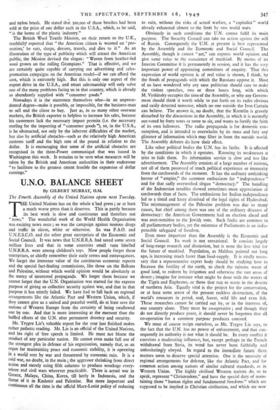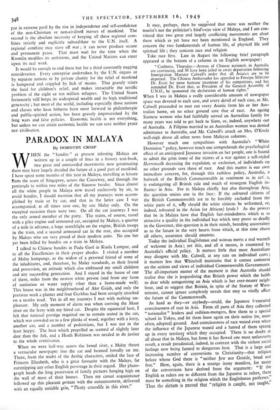U.N.O. BALANCE SHEET
By GILBERT MURRAY, O.M.
The Fourth Assembly of the United Nations opens next Tuesday. THE United Nations has on the whole ibad press ; or at least a much worse press than it deserves. This is partly because its best work is slow and continuous and therefore not "news." The wonderful work of the World Health Organisation was exciting news once ; so was the campaign against noxious drugs and traffic in slaves, white or otherwise. So was F.A.O. and U.N.E.S.C.O. and the other great enterprises of the Economic and Social Council. It was news that U.N.R.R.A. had saved some seven million lives and that in some countries small vans labelled U.N.R.R.A. were among children's toys. Now people forget these enterprises, or chiefly remember their early errors and extravagances. We forget the immense value of the continuous economic reports and the special fact-finding commissions, like those on the Balkans and Palestine, without which world opinion would be absolutely at the mercy of interested propaganda. We forget them because we cannot forget that the U.N. Organisation was started for the express purpose of giving us collective security against war, and that in that purpose it has utterly failed. We have had to fall back on regional arrangements like the Atlantic Pact and Western Union, which, if they cannot give us a united and peaceful world, do at least save the nations of Western Europe from the certainty of being swallowed one by one. And that is more interesting at the moment than the baffled efforts of the U.N. after permanent decency and security.
Mr. Trygve Lie's, valuable report for the year just finished makes rather pathetic reading. Mr. Lie is an official of the United Nations, and his right of 'free speech is limited. He must not blame the conduct of any particular nation. He cannot even make full use of the strongest plea in defence of his organisation, namely that, as an organ for maintaining peace and economic stability, it is operating in a world rent by war and threatened by economic ruin. It is a cold war, no doubt, in the main ; the aggressor shrinking from direct action and merely using fifth columns to produce wreckage every- where and civil wars wherever practicable. There is actual war in Greece, Malaya, China, Korea, till lately in Indonesia, and the threat of it in Kashmir and Palestine. But more important and continuous all the time is the official Marx-Lenirt policy of reducing to ruin, without the risks of actual warfare, a "capitalist" world already exhausted almost to the limit by two world wars.
Obviously in such conditions the U.N. cannot fulfil its main purpose. The Security Council can take no action against the will of Russia. Consequently the U.N. at present is best represented by the Assembly and the Economic and Social Council. The Assembly, though it cannot " act," can express world opinion and give some voice to the conscience of mankind. By means of its Interim Committee it is permanently in session, and it has the very important power of appointing committees of enquiry. That this expression of world opinion is of real value is shown, I think, by the floods of propaganda with which the Russians oppose it. Most of us have wondered why any sane politician should care to make the violent speeches, two or three hours long, with which M. Vyshinsky occupies the time of the Assembly, or why any Govern- ment should think it worth while to put forth on its radio obvious and easily detected nonsense, which no one outside the Iron Curtain can believe. The answer is, no doubt, that the Kremlin is gravely disturbed by the discussions in the Assembly, in which it is normally out-voted by forty votes or more to six, and wants to fortify the faith of its own followers. The radio propaganda is for domestic con- sumption, and is intended to overwhelm by its mass and fury any glimmer of information which may filter in from the outside world. The Assembly debates do have their effect.
Like other political bodies the U.N. has its faults. It is affected by the conditions in which it operates. Knowing its weaknesses it tries to hide them. Its information service is slow and too like advertisement. The Assembly consists of a large number of nations, not all of them possessed of much political experience or immunity from the catchwords of the moment. It has the ordinary unthinking horror of "empire," the common enthusiasm for " independence " and for that sadly overworked slogan "democracy." The handling of the Indonesian troubles showed sometimes more appreciation of catchwords than of facts. The enthusiasm for Indian independence led to a timid and hasty dismissal of the legal rights of Hyderabad., The mismanagement of the Palestine problem was due to many causes, but chief among them was one of the ordinary diseases of democracy: the American Government had an election ahead and was over-sensitive to the Jewish vote. Such faults are common to all parliamentary bodies, yet the existence of Parliaments is an indis- pensable safeguard of freedom.
Even more important than the Assembly is the Economic and Social Council. Its work is not sensational. It consists largely of long-range research and discussion, but is none the less vital for the future of mankind. Population, as Malthus pointed out long ago, is increasing much faster than food-supply. It is vitally neces- sary that a representative expert body should be studying how to increase the fertility of the earth, to check the ruinous waste of good land, to redeem by irrigation and otherwise the vast areas of desert ; imagine for instance what might be done with the waters of the Tigris and Euphrates, or those that run to waste in the deserts of northern Asia. Equally vital is the project for the conservation, or at least some arrest of the present reckless destruction, of the world's resources in petrol, coal, forest, wild life and even fish. These researches cannot be carried out by, or in the interests of, one country alone. They must be co-operative ; and though they do not directly produce peace, it should never be forgotten that all co-operation for a common purpose produces concord.
We must of course resign ourselves, as Mr. Trygvc Lie says, to the fact that the U.N. has no power of enforcement, and that con- sequently its authority is not what it should be. In every conflict it exercises a moderating influence, but, except perhaps in the French withdrawal from Syria, its word has never been faithfully and unhesitatingly obeyed. In regard to the immediate future three matters seem to deserve special attention. One is the necessity of regional arrangements for defence, like the Atlantic Pact, and for common action among nations of similar cultural standards, as in Western Union. The highly civilised Western nations do, so to speak, represent "Christendom," and have the special duty of main- taining those "human rights and fundamental freedoms" which arc supposed to be implied in Christian civilisation, and which arc now put in extreme peril by the rise in independence and self-confidence of the non-Christian or non-civilised masses of mankind. The second is the absolute necessity of keeping all these regional com- bines strictly and explicitly subordinate to the U.N. itself. A regional combine may stave off war ; it can never produce secure and permanent peace. That must wait for the time when the Kremlin modifies its ambitions, and fhe United Nations can enter upon its real work.
It would be enough to end there but for a third constantly nagging consideration. Every enterprise undertaken by the U.N. organs or by separate nations or by private charity for the relief of mankind is hampered and crippled by lack of means. That gravely stints the fund for children's relief, and makes intractable the terrific problem of the eight or ten million refugees. The United States fortunately still keeps its widespread wealth and its high traditional generosity ; but most of the world, including especially those nations and classes who have hitherto been most forward in philanthropic and public-spirited action, has been gravely impoverished by the long wars and false policies. Economic health is not everything, but unless we can attain economic health we can save neither peace nor civilisation.



































 Previous page
Previous page